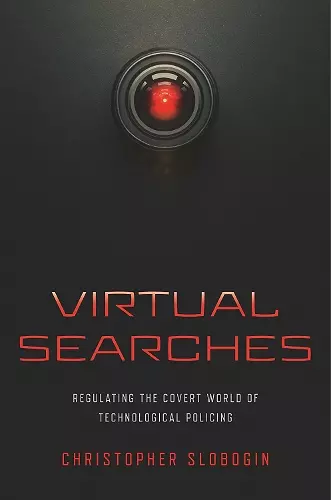Virtual Searches
Regulating the Covert World of Technological Policing
Format:Hardback
Publisher:New York University Press
Published:11th Oct '22
Should be back in stock very soon

Choice Outstanding Academic Title 2023
A close look at innovations in policing and the law that should govern them
A host of technologies—among them digital cameras, drones, facial recognition devices, night-vision binoculars, automated license plate readers, GPS, geofencing, DNA matching, datamining, and artificial intelligence—have enabled police to carry out much of their work without leaving the office or squad car, in ways that do not easily fit the traditional physical search and seizure model envisioned by the framers of the Constitution. Virtual Searches develops a useful typology for sorting through this bewildering array of old, new, and soon-to-arrive policing techniques. It then lays out a framework for regulating their use that expands the Fourth Amendment's privacy protections without blindly imposing its warrant requirement, and that prioritizes democratic over judicial policymaking.
The coherent regulatory regime developed in Virtual Searches ensures that police are held accountable for their use of technology without denying them the increased efficiency it provides in their efforts to protect the public. Whether policing agencies are pursuing an identified suspect, constructing profiles of likely perpetrators, trying to find matches with crime scene evidence, collecting data to help with these tasks, or using private companies to do so, Virtual Searches provides a template for ensuring their actions are constitutionally legitimate and responsive to the polity.
"Well-written, encyclopedic, and persuasive, Virtual Searches offers a fully-formed theory on the Fourth Amendment's future in the face of new technologies. The rigor and depth of Slobogin's analysis is rock solid and he offers a clear approach to regulating the hardest questions emerging around new policing technologies." - Andrew Guthrie Ferguson, author of The Rise of Big Data Policing: Surveillance, Race, and the Future of Law Enforcement "Cutting-edge and well-written, this is an important book on a critical issue in policing and surveillance, and it presents a number of original ideas that will assist academics and policymakers in navigating these issues. I have never seen any other scholar offer such a comprehensive typology for different types of digital surveillance." - Ric Simmons, Jacob E. Davis and Jacob E. Davis II Chair in Law, Moritz College of Law, The Ohio State University "In a world of pervasive cameras and sensors, data harvesting, and artificial intelligence, what will become of privacy? Steering a middle course between outright bans and hands-off complacency, Christopher Slobogin argues persuasively that different investigative strategies pose different levels of risks and deserve different kinds of oversight. He offers an invaluable road map to new forms of surveillance and a thoughtful set of proposals for how they can and should be regulated in a democratic society. This is essential reading for anyone interested in balancing the interests of privacy and crime control as technology changes the nature of law enforcement." - David Alan Sklansky, author of A Pattern of Violence: How the Law Classifies Crimes and What It Means for Justice ""A leading scholar of the security and privacy implications of digital policing, Slobogin points out that Virtual Searches is not actually about searches—at least not within the legal meaning of the term. And that is exactly the book's point (as its clever double-entendre of a title suggests): the Supreme Court's narrow interpretation of a Fourth Amendment 'search' allows police to adopt a vast swath of investigative tactics without having to get a warrant based on probable cause. At the same time, Slobogin recognizes that not all 'virtual searches' are created equal, and he provides a reasonable framework for thinking about how to regulate the different kinds of investigations enabled by existing surveillance technology."" - Emily Berman (Boston Review) "Virtual Searches is a timely and well-written addition to the widespread debate on how surveillance technologies should be regulated and by whom... a great addition to ongoing police technology debates, likely to be of use to legal scholars from both the U.S. and abroad." - Luke Chambers (Wrongful Conviction Law Review) "Slobogin develops a typology for sorting through this array of policing techniques and lays out a framework for regulating their use that expands the Fourth Amendment's privacy protections without blindly imposing its warrant requirement." (Law and Social Inquiry)
ISBN: 9781479812165
Dimensions: unknown
Weight: 526g
272 pages